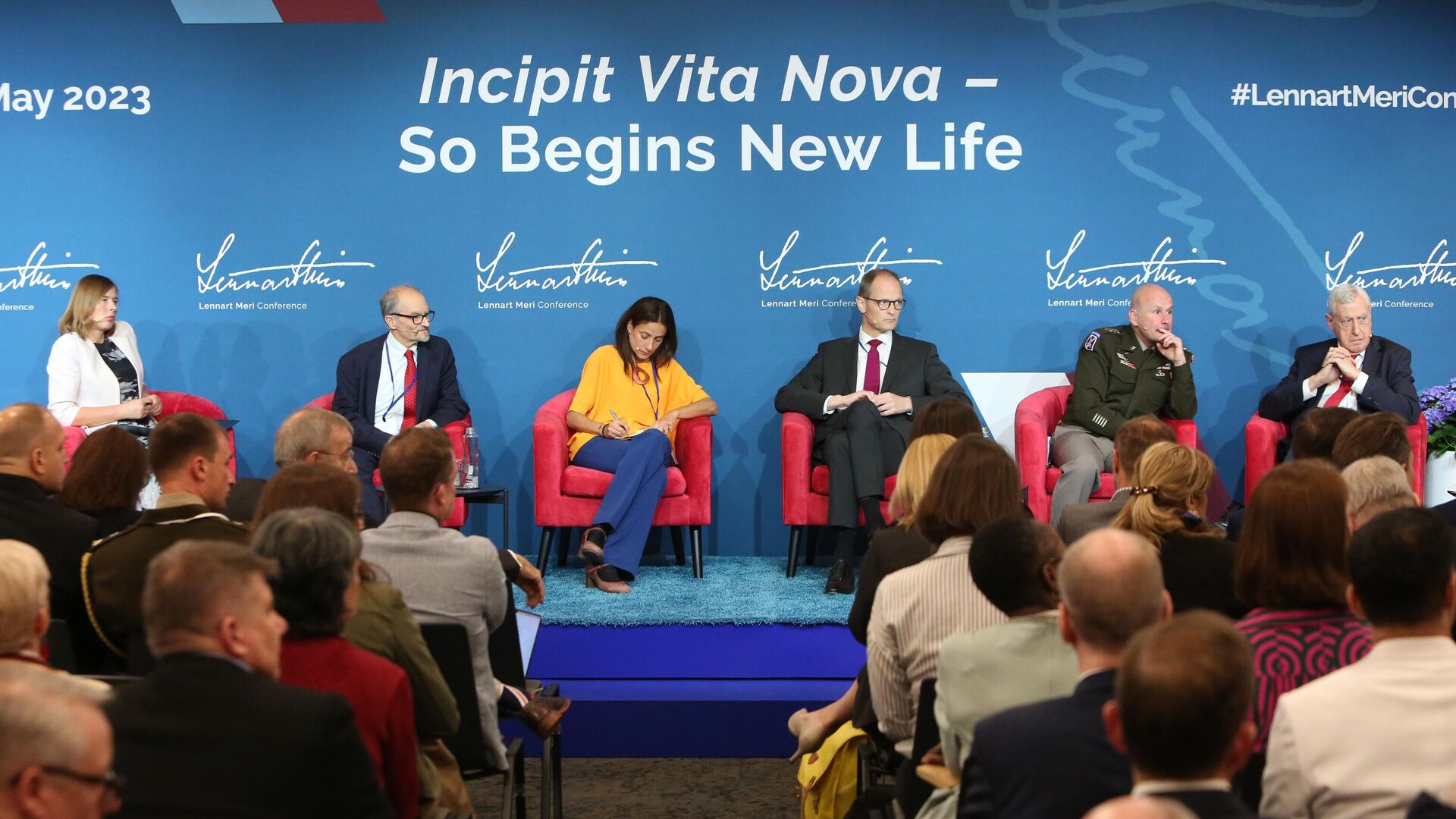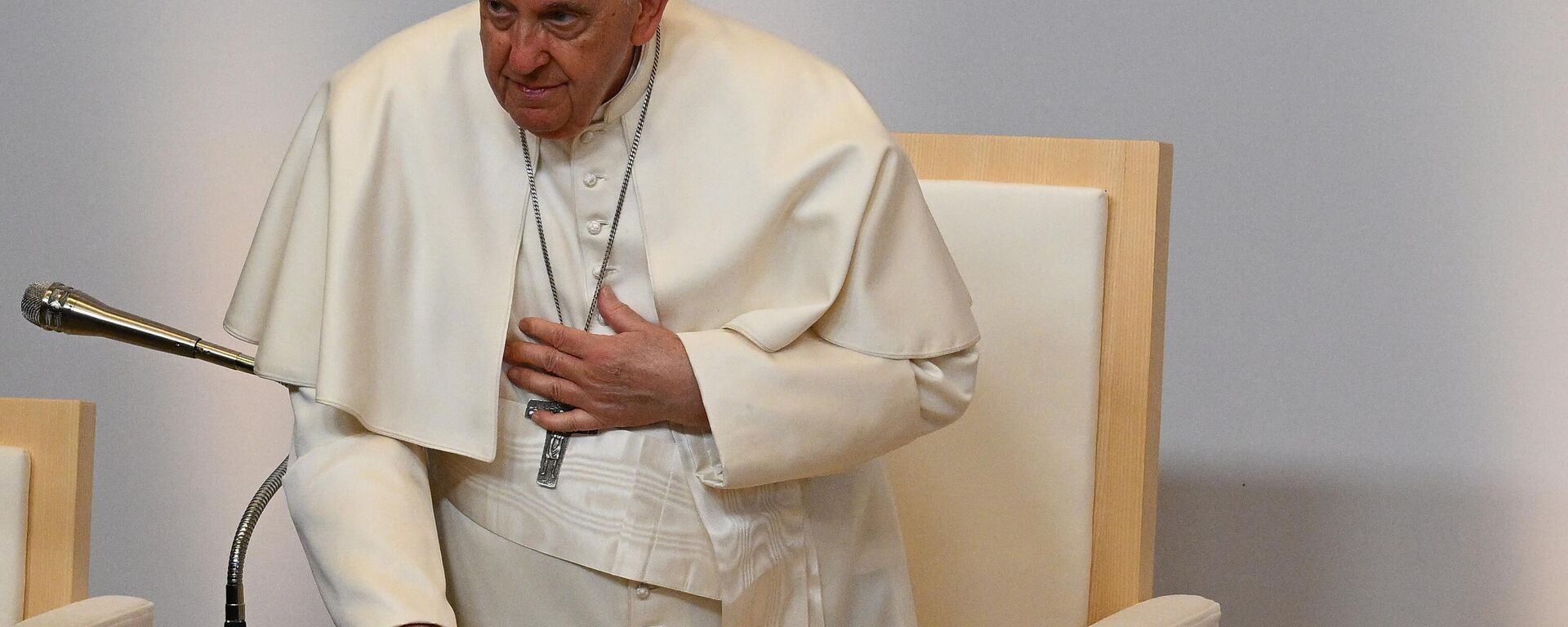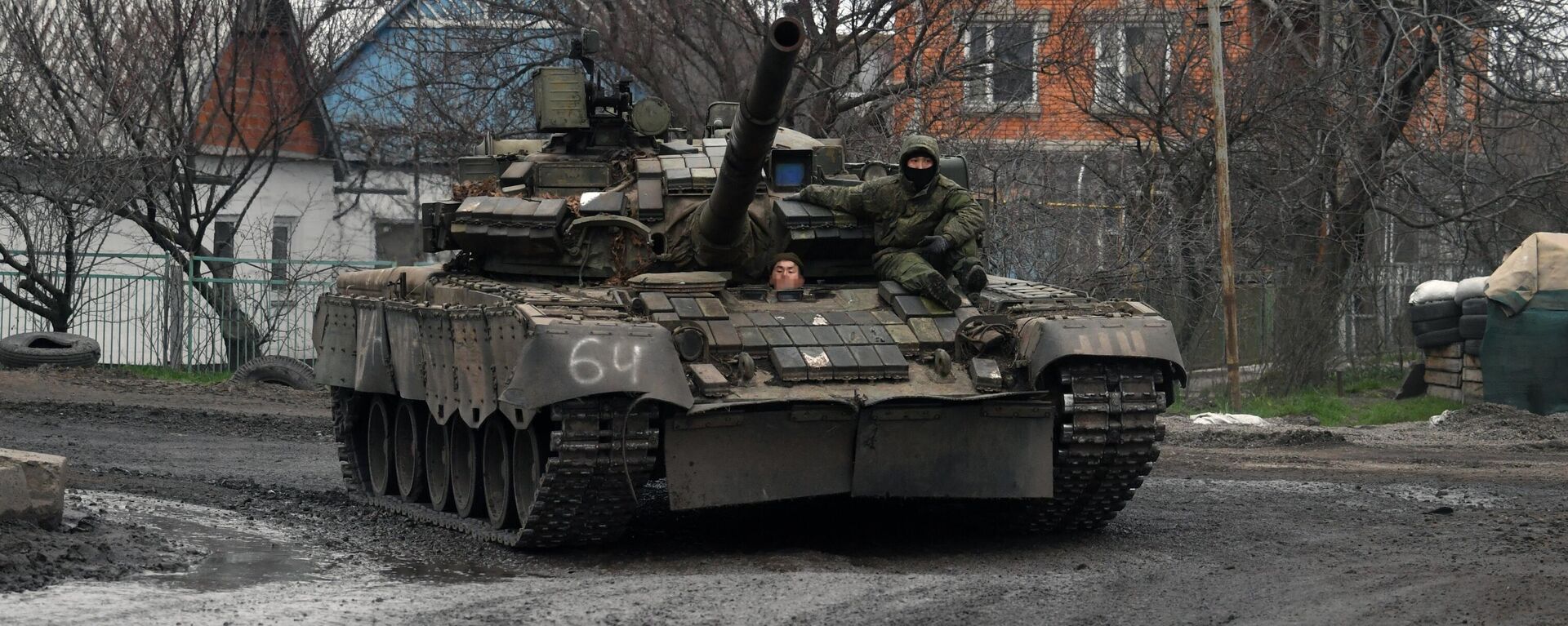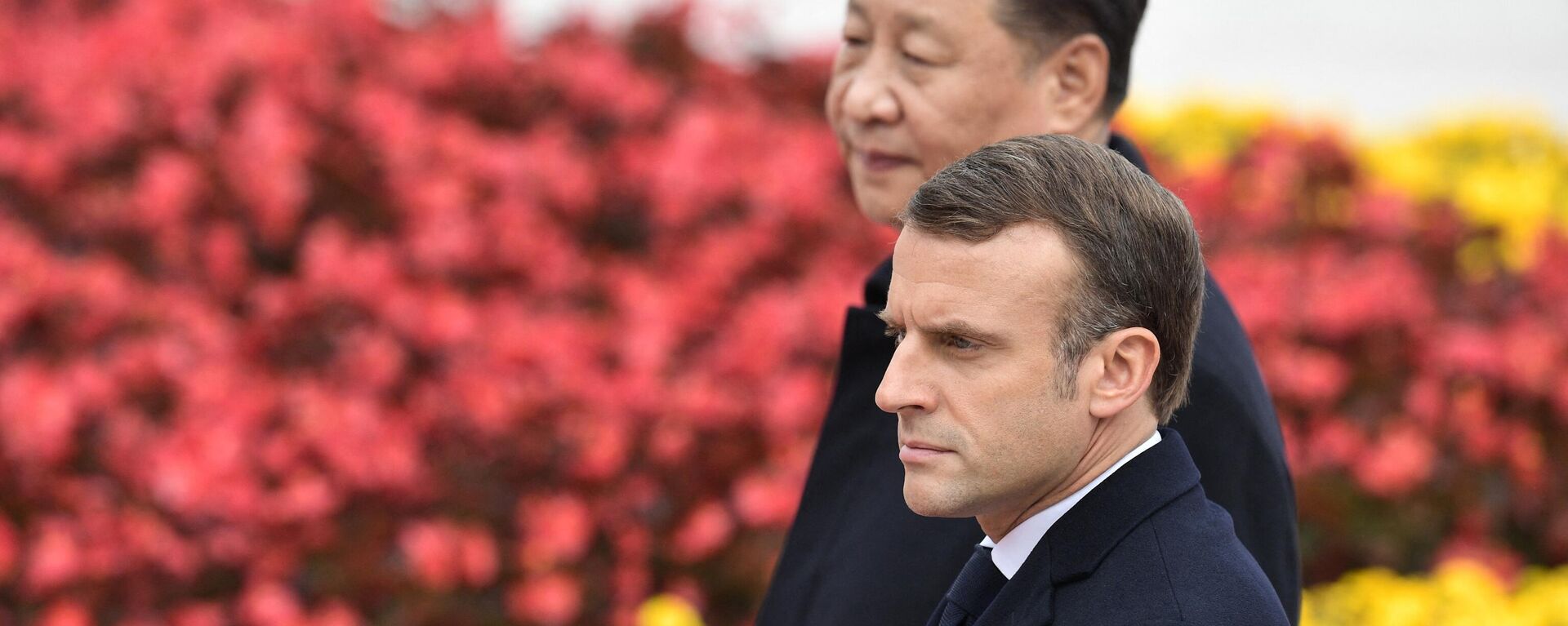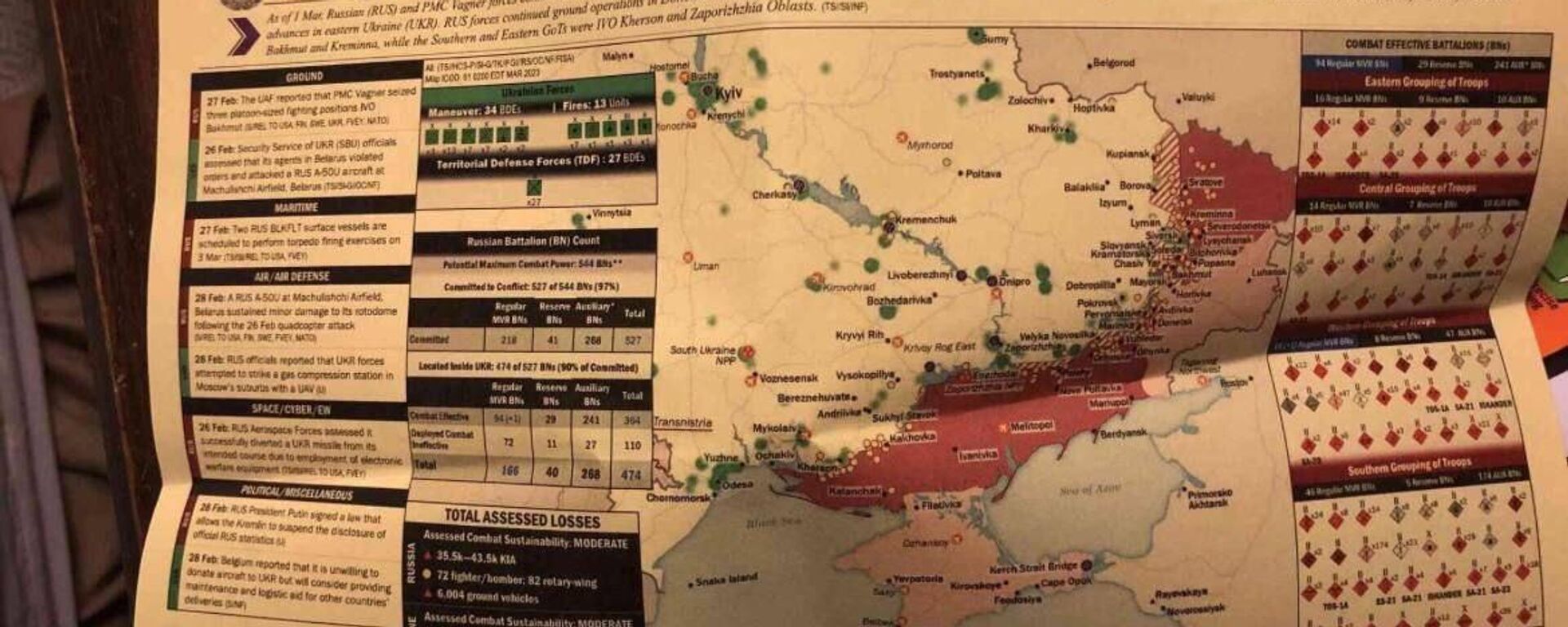https://sputnikglobe.com/20230514/tallinn-security-conference-pours-gasoline-on-fire-of-russia-nato-proxy-war-in-ukraine-1110355015.html
Tallinn Security Conference ‘Pours Gasoline on Fire’ of Russia-NATO Proxy War in Ukraine
Tallinn Security Conference ‘Pours Gasoline on Fire’ of Russia-NATO Proxy War in Ukraine
Sputnik International
Over 100 senior Western defense and foreign policy officials and experts gathered in Tallinn, Estonia May 12-14 to discuss the crisis in Ukraine. Giving Sputnik an exclusive inside look at the event, academic Joseph Siracusa said that with few exceptions, decision makers expressed support for a further dangerous escalation of tensions with Russia.
2023-05-14T18:00+0000
2023-05-14T18:00+0000
2023-05-17T13:41+0000
analysis
vladimir putin
volodymyr zelensky
nikita khrushchev
russia
ukraine
tallinn
nato
european union (eu)
leonid brezhnev
https://cdn1.img.sputnikglobe.com/img/07e7/05/0e/1110354472_0:35:3072:1763_1920x0_80_0_0_6b3451e76b1f66688ff822c7eb649f78.jpg
The Lennart Meri Conference in Tallinn wrapped up Sunday after three days of discussions on NATO-Russia proxy war in Ukraine, maritime security, cyber threats, the push to continue the expansion of NATO and the EU, sanctions, and the threat of a nuclear war.The conference featured multiple big names, including US European Command and NATO Supreme Allied Commander Europe Christopher Cavoli, David Cattler, NATO’s assistant secretary general for intelligence and security, former US Deputy Secretary of State Stephen Biegun, European Council on Foreign Relations Co-Chairman Carl Bildt, former US Ambassador to Russia Michael McFaul, French presidential advisor Xavier Chatel, and the prime ministers of Estonia, Latvia, and Lithuania. A keynote lecture was provided by former US National Security Council director and presidential advisor Fiona Hill, a prominent Russia hawk in the Trump administration.The event was also attended by Dr. Joseph M. Siracusa, a renowned US professor of history and international diplomacy who serves as dean of Global Futures at Curtin University, and is the author of more than 30 books on diplomacy and international security. Dr. Siracusa provided Sputnik with detailed impressions on the event, saying that from his vantage point, it consisted mostly of “hardline anti-Russian types” not in the mood for any sort of dialogue with Moscow or any desire to put a stop to the bleeding wound that is modern-day Ukraine.“I was hoping that when I came here, there would be a number of sessions on how peace might be achieved – that is, how a ceasefire might be achieved and what can be done about it,” the scholar said.Unfortunately, the academic, who spoke at the conference’s session on nuclear risks, said the event proved unforgivingly and unrelentingly anti-Russia, with most speakers operating under a “Ukraine can do no bad, Russia can do no good,” “Russia is…the total aggressor” principle, and “pouring gasoline” on the conflict by cheerleading its continuation and calling for an expansion of the US military footprint in Eastern Europe.“If they adhere to Zelensky’s ceasefire, the war in Ukraine will go on for years,” the scholar warned. Even if the conflict continues for just six more months, that’s going to mean thousands more dead, the academic said. “I regard the loss of Russian lives as equal to the loss of Ukrainian lives. When you start losing lives over something that could have been solved diplomatically, what we have here is criminal negligence,” he added.Drang nach Osten 2.0?The academic agreed with Sputnik’s assessment of the Tallinn conference being a kind of preview of the upcoming NATO Summit in Vilnius, Lithuania scheduled for July, and said that unfortunately, there is “unanimity” of support for the alliance’s expansion, “of bringing in more American troops in this part of the world,” and for bringing Ukraine in as a formal member after years of de facto, “invisible member” status.The alliance’s attitude is very dangerous, Siracusa said, since the conflict in Ukraine started in the first place “because of the failure of the United States and the Russian Federation to have a serious discussion about the expansion of NATO.”Pointing to “delusional” notions expressed at the Tallinn conference about Kiev being “on the cusp of victory,” Siracusa warned that Kiev today is not in such a position, and that the only thing a continuation of the conflict will do is result in more death and destruction.“Zelensky’s policy – and I regard him as a failed politician – the idea that they’re ‘holding out for a victory’ just means more deaths both on the Ukrainian side and on the Russian side. And I decry all these people who are dying for things that could have been solved last year [through diplomacy, ed.]. It seems to me that this is a profound, unnecessary waste of lives. I do not like the idea that people are more interested in further conflict than in resolving the problem. They live in a world of make-believe. They don’t know when it’s going to end or how it’s going to end. But what they’re dreaming about is a Russian defeat and a regime change and crushing rearrangement of Russian society,” the scholar said.Conflict Rooted in AnachronismSiracusa, a veteran historian who has studied the Cold War of the 20th century extensively, says the Ukraine crisis is tragic and nonsensical because the US failed to learn the lessons of the Cuban Missile Crisis of 1962 – a textbook case of how a conflict between nuclear superpowers can be resolved without going to war.From the academic’s perspective, the tensions between Washington and Moscow over NATO are tensions over an anachronism, because the alliance should have dissolved after the Cold War ended and the USSR and the Warsaw Pact alliance disappeared as potential threats to the West.Siracusa was also struck by the willful ignorance of conference attendees regarding the Russia-Ukraine crisis and Russia’s role in the history of Eastern Europe in general.Russia and Ukraine have a shared heritage, Siracusa stressed, "but these people act like Russia came, you know, came from the dark side of the Moon. Like there’s no connection between Eastern Europe, Ukraine and Russia, when in fact, you’re all part of a shared history."Orwellian LanguageAnother detail of the conference that Siracusa found interesting was the use of the term “proxy war” in reference to the Ukrainian crisis – a term used extensively by Russian officials, including Putin and Foreign Minister Sergey Lavrov, and increasingly by some Western media. The term was used in Tallinn, but its meaning flipped on its head, according to the observer.Nuclear BombshellThe most significant thing that stood out to Siracusa at the event in Tallinn was the casual way in which the potential use of nuclear weapons was discussed. In one of the talks, featuring Chatham House Rules (which prevent Siracusa from explicitly naming or identifying the speaker), a senior former US official was asked how the US might respond if Russia used a tactical nuclear weapon in Ukraine.“That would be to me not only a major escalation, but it would be one that cannot be called back. It would create far more problems and prepare the road to World War III,” Siracusa summed up.
https://sputnikglobe.com/20230513/ukraines-zelensky-rejects-popes-offer-of-mediation-1110331575.html
https://sputnikglobe.com/20230513/ukraine-loses-almost-300-military-mercenaries-in-donetsk-direction-over-past-day---moscow-1110316273.html
https://sputnikglobe.com/20130822/Secret-Tapes-Reveal-Nixon-Brezhnev-in-Warm-Chat-182914674.html
https://sputnikglobe.com/20230407/france-should-submit-its-own-plan-on-conflict-resolution-in-ukraine-xi-jinping-says-1109245840.html
https://sputnikglobe.com/20230413/pentagon-leaks-prove-west-is-fighting-proxy-war-in-ukraine-1109463535.html
https://sputnikglobe.com/20230418/medvedev-west-demands-guarantees-from-russia-but-hints-at-future-nuclear-conflict-1109619564.html
russia
ukraine
tallinn
soviet union
Sputnik International
feedback@sputniknews.com
+74956456601
MIA „Rossiya Segodnya“
2023
News
en_EN
Sputnik International
feedback@sputniknews.com
+74956456601
MIA „Rossiya Segodnya“
Sputnik International
feedback@sputniknews.com
+74956456601
MIA „Rossiya Segodnya“
ukraine, nato, estonia, conference, alliance, russia, conflict, crisis, escalation
ukraine, nato, estonia, conference, alliance, russia, conflict, crisis, escalation
Tallinn Security Conference ‘Pours Gasoline on Fire’ of Russia-NATO Proxy War in Ukraine
18:00 GMT 14.05.2023 (Updated: 13:41 GMT 17.05.2023) Over 100 senior Western defense and foreign policy officials and experts gathered in Tallinn, Estonia May 12-14 to discuss the crisis in Ukraine. Giving Sputnik an exclusive inside look at the event, academic Joseph Siracusa said that with few exceptions, decision makers expressed support for a further dangerous escalation of tensions with Russia.
The Lennart Meri Conference in Tallinn wrapped up Sunday after three days of discussions on NATO-Russia proxy war in Ukraine, maritime security, cyber threats, the push to continue the expansion of NATO and the EU, sanctions, and the threat of a nuclear war.
The conference featured multiple big names, including US European Command and NATO Supreme Allied Commander Europe Christopher Cavoli, David Cattler, NATO’s assistant secretary general for intelligence and security, former US Deputy Secretary of State Stephen Biegun, European Council on Foreign Relations Co-Chairman Carl Bildt, former US Ambassador to Russia Michael McFaul, French presidential advisor Xavier Chatel, and the prime ministers of Estonia, Latvia, and Lithuania. A keynote lecture was provided by former US National Security Council director and presidential advisor Fiona Hill, a
prominent Russia hawk in the Trump administration.
The event was also attended by Dr. Joseph M. Siracusa, a renowned US professor of history and international diplomacy who serves as dean of Global Futures at Curtin University, and is the author of more than 30 books on diplomacy and international security. Dr. Siracusa provided Sputnik with detailed impressions on the event, saying that from his vantage point, it consisted mostly of “hardline anti-Russian types” not in the mood for any sort of dialogue with Moscow or any desire to put a stop to the bleeding wound that is modern-day Ukraine.
“I was hoping that when I came here, there would be a number of sessions on how peace might be achieved – that is, how a ceasefire might be achieved and what can be done about it,” the scholar said.
Unfortunately, the academic, who
spoke at the conference’s session on nuclear risks, said the event proved unforgivingly and unrelentingly anti-Russia, with most speakers operating under a “Ukraine can do no bad, Russia can do no good,” “Russia is…the total aggressor” principle, and “pouring gasoline” on the conflict by cheerleading its continuation and calling for an expansion of the US military footprint in Eastern Europe.
“They have intellectuals here from Oxford University, [Professor of European Studies] Timothy Ash, who is for retribution. He said that Russia must be defeated, Putin must be taken down, and the Russian nation should be subjected to the same kind of treatment as Nazi Germany after World War Two ‘so that it could never conduct aggression again,’” Siracusa said. “No one is interested in dialogue with Russia. No one is interested in a peaceful solution…They all endorse Zelensky’s 10-point ‘peace program,’ which includes the removal of Russian troops from Crimea and the Donbass. And of course, that is just a fantasy, that’s never going to happen.”
“If they adhere to Zelensky’s ceasefire, the war in Ukraine will go on for years,” the scholar warned. Even if the conflict continues for just six more months, that’s going to mean thousands more dead, the academic said. “I regard the loss of Russian lives as equal to the loss of Ukrainian lives. When you start losing lives over something that could have been solved diplomatically, what we have here is criminal negligence,” he added.
“There are very few people here who are looking to the future. They have entire sessions on expanding NATO. They see the next expansion of NATO to include Georgia, Moldova and Ukraine, and they believe that it’s very necessary. And as I say, no one’s looking for the way out of this,” Siracusa said.
The academic agreed with Sputnik’s assessment of the Tallinn conference being a kind of preview of the upcoming NATO Summit in Vilnius, Lithuania scheduled for July, and said that unfortunately, there is “unanimity” of support for the alliance’s expansion, “of bringing in more American troops in this part of the world,” and for bringing Ukraine in as a formal member after years of de facto, “invisible member” status.
The alliance’s attitude is very dangerous, Siracusa said, since the conflict in Ukraine started in the first place “because of the failure of the United States and the Russian Federation to have a serious discussion about the expansion of NATO.”
“I think it was a failure in diplomacy which caused the crisis. It’s a failure in diplomacy that’s prolonging the crisis. And nobody’s really looking for a way out here. They see Ukrainian victory as very important and inevitable. Now, that’s not going to happen. So they have sort of an unrealistic expectation about what Ukraine could do,” the academic believes.
Pointing to “delusional” notions expressed at the Tallinn conference about Kiev being “on the cusp of victory,” Siracusa warned that Kiev today is not in such a position, and that the only thing a continuation of the conflict will do is result in more death and destruction.
“Zelensky’s policy – and I regard him as a failed politician – the idea that they’re ‘holding out for a victory’ just means more deaths both on the Ukrainian side and on the Russian side. And I decry all these people who are dying for things that could have been solved last year [through diplomacy, ed.]. It seems to me that this is a profound, unnecessary waste of lives. I do not like the idea that people are more interested in further conflict than in resolving the problem. They live in a world of make-believe. They don’t know when it’s going to end or how it’s going to end. But what they’re dreaming about is a Russian defeat and a regime change and crushing rearrangement of Russian society,” the scholar said.
Conflict Rooted in Anachronism
Siracusa, a veteran historian who has studied the Cold War of the 20th century extensively, says the Ukraine crisis is tragic and nonsensical because the US failed to learn the lessons of the Cuban Missile Crisis of 1962 – a textbook case of how a conflict between nuclear superpowers can be resolved without going to war.
“The Cuban Missile Crisis was resolved by President John F. Kennedy and General Secretary [Nikita] Khrushchev. Khrushchev decided to withdraw the missiles and the United States pledged not to invade Cuba. My argument to these people is that President Biden never had an important discussion with President Putin before these hostilities began,” he said. “This war could have been avoided if Joe Biden had told [the Russian] president that NATO was not going into Ukraine, that there would be no advanced weapons systems on [Russia's] borders,” Siracusa said.
From the academic’s perspective, the tensions between Washington and Moscow over NATO are tensions over an anachronism, because the alliance should have dissolved after the Cold War ended and the USSR and the Warsaw Pact alliance disappeared as potential threats to the West.
Siracusa was also struck by the willful ignorance of conference attendees regarding the Russia-Ukraine crisis and Russia’s role in the history of Eastern Europe in general.
“I would like to point out to these people that one of [the] greatest [Soviet] general secretaries, Leonid Brezhnev, was Ukrainian. It’s not as if these people discovered what it means to be in the Russian orbit. I believe that Russia has a right to friendly borders, because it is a large power and is entitled to neutrality on its borders, the same way the United States insists that Mexico and Canada have no major relationships with China or Russia today,” the academic said.
22 August 2013, 16:11 GMT
Russia and Ukraine have a shared heritage, Siracusa stressed, "but these people act like Russia came, you know, came from the dark side of the Moon. Like there’s no connection between Eastern Europe, Ukraine and Russia, when in fact, you’re all part of a shared history."
Another detail of the conference that Siracusa found interesting was the use of the term “proxy war” in reference to the Ukrainian crisis – a term used extensively by Russian officials, including Putin and Foreign Minister Sergey Lavrov, and increasingly by some Western media. The term was used in Tallinn, but its meaning flipped on its head, according to the observer.
“What they[have said] here, what their lead speakers [have said] here is that Putin is using the war in Ukraine as a proxy war against NATO – that the war in Ukraine is designed to reshuffle the architecture of Europe and to drive a wedge between the Americans and the Europeans. So they turned the proxy war from the American proxy war in Russia to the Russian proxy war against Ukraine. This takes a great deal of imagination. And it’s also dead wrong,” Siracusa said.
The most significant thing that stood out to Siracusa at the event in Tallinn was the casual way in which the potential use of nuclear weapons was discussed. In one of the talks, featuring Chatham House Rules (which prevent Siracusa from explicitly naming or identifying the speaker), a senior former US official was asked how the US might respond if Russia used a tactical nuclear weapon in Ukraine.
“He said, and I think he didn’t mean to say this, [that] ‘the American response, which has been delivered to Russia through back channels, is that there would be a major conventional attack on Crimea and the Russian Fleet,” Siracusa said.
“That would be to me not only a major escalation, but it would be one that cannot be called back. It would create far more problems and prepare the road to World War III,” Siracusa summed up.
